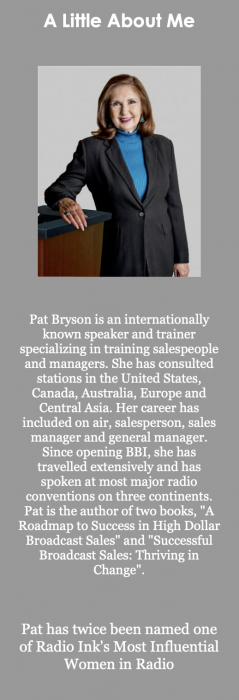Selling Radio Direct With Pat Bryson.
Last week I spent 5 days working with a new hire. Note I said, “New Hire” which should send you all into spasms of envy that we found a new salesperson. Not only did we find one, but he pursued US and he is absolutely thrilled to be in the radio industry. When was the last time that happened to you?
This gentleman has no history in radio. He has some history in sales, but in an entirely different industry and sales system. So, he is a novice.
His first day on the job, I arrived. I prefer to come a week or so later, but the timing worked out this way. We began with “radio 101” and then proceeded to work on learning my sales system: best practices, how to plan your daily activities, prospecting, doing good needs analysis meetings, writing proposals, handling objections, understanding the basics of how marketing works on the brain of consumers, how to create effective campaigns, what makes a great radio commercial, using ROI sheets. In other words, the plan he must follow to insure success.
 The last day, we did something additional. I had the owner and the tenured salespeople come into our meeting and share the history of the stations.
The last day, we did something additional. I had the owner and the tenured salespeople come into our meeting and share the history of the stations.
Which brings up the subject of this newsletter: what is your on-boarding system?
One of the problems we encounter, other than finding good people to hire, is keeping good people. And one of the reasons people leave is that they have not fallen in love with the radio industry. They don’t understand WHY we do what we do. They don’t understand how vital the radio industry is to the communities we serve. Nor do they understand that advertising is the grease on the wheels of commerce. When consumers buy, the economy improves. Advertising delivers messages from businesses to potential consumers. Our life blood is the local business person and we can help them to compete with the giant companies of the world.
So, what should be included in your on-boarding process?
Ideally, the owner or general manager of the company should set aside some time to meet the new person and to share their history and their “Why?”. They should share their vision for the company moving forward.
The new hire should spend some time with each department in the station: sit in on a morning show and listen to the interaction with listeners. Watch the production department produce commercials. Watch the traffic department do their jobs (no person new to radio understands what a traffic person does. They think of the cross walk guard in the neon yellow vest.) Go out with the current sales staff to see them in action. Go to station promotions to SEE the listeners.
Learn the forms and paperwork that each station needs to function. In other words, the internal flow of information. What resources are available at the station to help them to do their job?
At each and every step, emphasize the “Why?”
I remember the first time I attended an NAB. I saw 100,000 broadcasters in one place and it hit me that this was the tip of the iceberg. The rest of the staffs were still at home running the stations. Wow! I was blown away by how big and powerful we are!
New hires need to feel that they are a part of something bigger than one station or group. Yes, they need to enjoy their fellow workers. They need to believe in our mission. But they also need to believe in the mission of radio in general.
Radio is not dead nor dying. We have only to remember how vital we were in 2020. We remain that vital as we serve our communities in a hundred different ways. We should all be proud to call ourselves “radio broadcasters”.
I hope you may formulate your own on-boarding system. Indoctrinate the new hires in the best of our industry. Welcome them into the midst of one of the best jobs in the world.
Happy recruiting and happy retaining!

